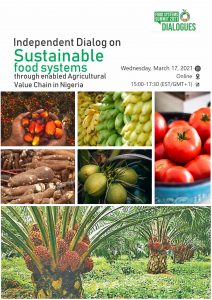الملاحظات التقييمية الرسمية على الحوارات إلى قمة الأمم المتحدة للنظم الغذائية لعام 2021
نوع الحوار
بدعوة من
لغة فعالية الحوار
التاريخ/الوقت
إلى:
المدينة
نطاق التركيز الجغرافي
التنسيق
يُرجى مراجعة التفاصيل أدناه للحصول على معلومات التسجيل إذا كانت متوفرة أو الاتصال بمنظم الحوار إذا كنت ترغب في الحضور.
القيّم
الوصف
Despite oil, agriculture remains the base of the Nigerian economy, providing the main source of livelihood for most Nigerians. In 2017, farming alone accounted for about 68% of rural income in Africa and about half of the rural income in South Asia. Agriculture remains the largest sector in Nigeria contributing an average of 24% to the nation’s GDP between 2013-2019. The sector also employs more than 36% of the country’s labour force. While the Nigerian agricultural sector is mainly focused on crop production, which accounts for 90% of output, the value chain across the sector remains highly untapped. For example, analysis from the cocoa barometer suggests that in the production of a bar of chocolate, a marginal 6.6% of the value addition is in the production, while the remaining is in the processing, marketing and retail segments of the value chain.
Nigeria focuses mostly on food production with little concentration on the processing and manufacturing including harnessing technology know-how in the value chain. The chain reaction that arises from shortages of resources, lack of financing for small scale farmers and inefficient transport systems, limits the growth, production and reach of safe and nutritious food along the value and supply chain. The level of inherent inefficiencies in the Nigerian Agricultural Value Chain has equally hindered the ability of the sector to be at its premium performance.
Effective packaging adds value to produce, enables traceability, enhances standardization, and provides feedback thereby gaining the confidence of customers. However, packaging and standardization have been one of the pitfalls for growth in Nigeria agribusiness as well as its value chain. Technology application in the value chain reportedly has an undertone impact yet.
Agricultural value chains hold considerable promise in reducing poverty and promoting inclusive growth when the poor and other marginal groups participate in them. Under the right conditions, value chains can move smallholder farmers from subsistence into commercial agriculture.
Addressing gaps such as unmet market demand or seeking opportunities for vertical and horizontal integration, greater specialization, and the expansion of services to take care of the fundamental short-term and longer-term challenges facing the sustainability of food systems in Nigeria requires insightful, integrated and inclusive contribution and partnership of all stakeholders to thinker timely response, interventions and strategies to birth sustainable food systems in Nigeria.
Read Full Concept Note here: https://bit.ly/3r9oZlJ
Register here: https://tinyurl.com/y4x5zz2z


